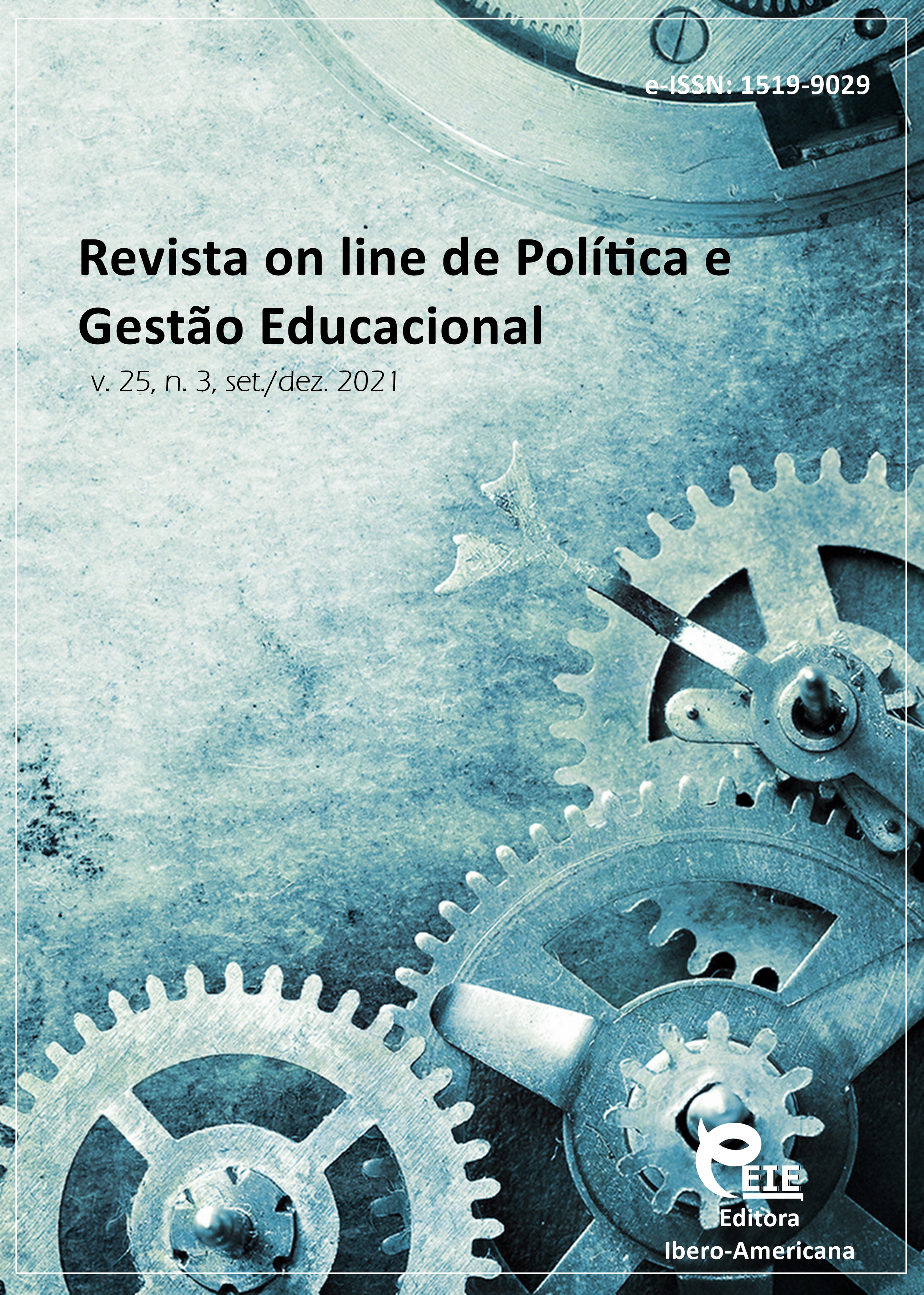Peculiarities of the higher education development in a blended learning environment
DOI:
https://doi.org/10.22633/rpge.v25i3.15959Keywords:
Pedagogy, Blended learning, EnvironmentAbstract
This article aims to identify the peculiarities of the higher education pedagogy transformation through the blended learning model. The methodology was based on a statistical, correlational analysis by using The Teaching and Learning International Survey database containing the survey results of 7,823 educators in France and the Netherlands. The study revealed an average level of teacher preparation for blended learning (50.5%) and preparation for information and communication technology (ICT) use in student learning (48.4%) components inclusion. A significant level of teachers’ professional development of ICT skills was revealed (44% take courses). An average level of teachers’ unpreparedness both for blended learning (28.9% not ready, 36.6% not prepared enough) and ICT use in practice was established (30.3% almost not ready, 34.25 not prepared enough). A positive correlation was established between the teachers’ preparation for the blended learning environment and the passage of professional ICT skills development courses.
Downloads
References
ARNESEN, K. T. et al. Experiences with Personalized Learning in a Blended Teaching Course for Preservice Teachers. Journal of online learning research, Waynesville, v. 5, n. 3, p. 275-310, 2019. Available: https://www.learntechlib.org/primary/p/210637. Access: 5 Dec. 2021.
ARNEY, L. Go blended!: A handbook for blending technology in schools. Hoboken: John Wiley & Sons, 2014.
BORUP, J. et al. Academic Communities of Engagement: an expansive lens for examining support structures in blended and online learning. Educational Technology Research and Development, Chestnut Hill, v. 68, n. 2, p. 807-832, 2020. DOI: https://doi.org/10.1007/s11423-020-09744-x
DZIUBAN, C. et al. Blended learning: the new normal and emerging technologies. International Journal of Educational Technology in Higher Education, Barcelona, v. 15, n. 1, p. 1-16, 2018. DOI: https://doi.org/10.1186/s41239-017-0087-5
GRAHAM, C. R. Blended learning models. In: KHOSROW-POUR, M. Encyclopedia of Information Science and Technology. 2. ed. Pennsylvania: IGI Global, 2009. p. 375-382. DOI: https://doi.org/10.4018/978-1-60566-026-4.ch063
GRAHAM, C. R. Current research in blended learning. In: Handbook of distance education. England: Routledge, 2013a. p. 173-188.
GRAHAM, C. R. Emerging practice and research in blended learning. In: Handbook of distance education. England: Routledge, 2013b. p. 351-368.
GRAHAM, C. R. et al. K–12 Blended Teaching Readiness: Model and Instrument Development. Journal of Research on Technology in Education, Gainesville, v. 51, n. 3, p. 239-258, 2019. DOI: https://doi.org/10.1080/15391523.2019.1586601
HRASTINSKI, S. What do we mean by blended learning? TechTrends, Statesboro, v. 63, n. 5, p. 564-569, 2019. DOI: https://doi.org/10.1007/s11528-019-00375-5
LÓPEZ-PÉREZ, M. V.; PÉREZ-LÓPEZ, M. C.; RODRÍGUEZ-ARIZA, L. Blended learning in higher education: Students’ perceptions and their relation to outcomes. Computers & Education, Tempe, v. 56, n. 3, p. 818-826, 2011. DOI: https://doi.org/10.1016/j.compedu.2010.10.023
MANWARING, K. C. et al. Investigating student engagement in blended learning settings using experience sampling and structural equation modeling. The Internet and Higher Education, Hong Kong, v. 35, p. 21-33, 2017. DOI: https://doi.org/10.1016/j.iheduc.2017.06.002
MOSKAL, P.; DZIUBAN, C.; HARTMAN, J. Blended learning: A dangerous idea? The Internet and Higher Education, Hong Kong, v. 18, p. 15-23, 2013. DOI: https://doi.org/10.1016/j.iheduc.2012.12.001
ORGANISATION FOR ECONOMIC COOPERATION AND DEVELOPMENT. TALIS 2018 Results (Volume I): Teachers and School Leaders as Lifelong Learners. Paris: OECD Publishing, 2019. DOI: https://doi.org/10.1787/1d0bc92a-en
PORTER, W. W. et al. Blended learning in higher education: Institutional adoption and implementation. Computers & Education, Tempe, v. 75, p. 185-195, 2014. DOI: https://doi.org/10.1016/j.compedu.2014.02.011
PORTER, W. W. et al. A qualitative analysis of institutional drivers and barriers to blended learning adoption in higher education. The internet and Higher education, Hong Kong, v. 28, p. 17-27, 2016. DOI: https://doi.org/10.1016/j.iheduc.2015.08.003
PULHAM, E.; GRAHAM, C. R. Comparing K-12 online and blended teaching competencies: a literature review. Distance Education, London, v. 39, n. 3, p. 411-432, 2018. DOI: https://doi.org/10.1080/01587919.2018.1476840
PULHAM, E.; GRAHAM, C.; SHORT, C. Generic vs. Modality-Specific Competencies for K-12 Online and Blended Teaching. Journal of Online Learning Research, Waynesville, v. 4, n. 1, p. 33-52, 2018. Available: https://files.eric.ed.gov/fulltext/EJ1174455.pdf. Access: 5 Dec. 2021.
SMITH, K.; HILL, J. Defining the nature of blended learning through its depiction in current research. Higher Education Research & Development, Hobart, v. 38, n. 2, p. 383-397, 2019. DOI: https://doi.org/10.1080/07294360.2018.1517732
SPRING, K. J.; GRAHAM, C. R.; HADLOCK, C. A. The current landscape of international blended learning. International Journal of Technology Enhanced Learning, Geneva, v. 8, n. 1, p. 84-102, 2016. DOI: https://doi.org/10.1504/IJTEL.2016.075961
VAUGHAN, N. Perspectives on Blended Learning in Higher Education. International Journal on E-learning, Waynesville, v. 6, n. 1, p. 81-94, 2007. Available: https://eric.ed.gov/?id=EJ747810. Access: 5 Dec. 2021.
Published
How to Cite
Issue
Section
License
Copyright (c) 2021 Revista on line de Política e Gestão Educacional

This work is licensed under a Creative Commons Attribution-NonCommercial-ShareAlike 4.0 International License.
Manuscritos aceitos e publicados são de propriedade da Revista on line de Política e Gestão Educacional. É vedada a submissão integral ou parcial do manuscrito a qualquer outro periódico. A responsabilidade do conteúdo dos artigos é exclusiva dos autores. É vedada a tradução para outro idioma sem a autorização escrita do Editor ouvida a Comissão Editorial Científica.










